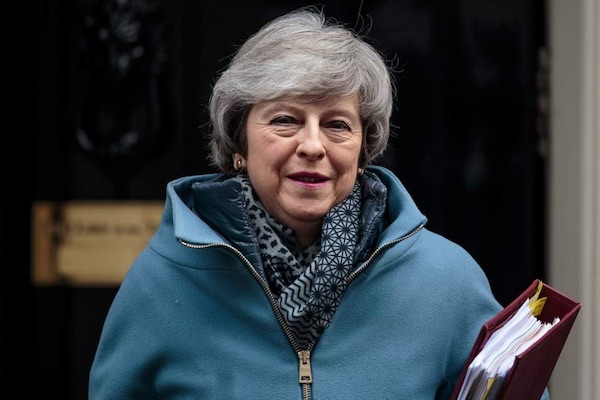
With time running out to avert a disastrous crash Brexit, there is a growing consensus in Ireland and Europe that British Prime Minister Theresa May is not sincere about negotiating a deal with the European Union, and probably cannot be trusted to honour one in any event.
Irish confidence in May’s ability to secure a deal is at an all-time low after she reneged on the critical ‘backstop’ element, designed to prevent a remilitarisation of Britain’s border through Ireland. That move runs contrary to the Good Friday Agreement and brought back grim accusations by Sinn Féin of Tory ‘bad faith’ and ‘dishonour’.
Despite making the backstop u-turn to appease her party’s extreme right wing, there was another humiliating setback for May on Thursday night when MPs failed to back her in a near identical vote, amid allegations of conspiracy and ineptitude.
EU officials then accused the British PM of “pretending to negotiate” after she held meetings without any new proposals to break the deadlock. One EU diplomat said May’s strategy was probably to run down the clock “sending her negotiators here and there” to buy time ahead of a European summit on 21-22 March. “They come forward with the same proposals and they get the same answers,” the diplomat said.
Britain has now attempted several different strategies to encourage the EU to undermine the backstop, including a time limit, an “exit mechanism” or unspecified “alternative arrangements”.
“Time limit, exit clause, magical solutions based on technology, these are all things we have heard before,” a senior EU official said. “We cannot start inventing solutions for the British.”
Speaking after May visited Belfast last week to address business figures, McDonald blasted the British Prime Minister who she said had “come here empty handed with the same old rhetoric with no plan, no credibility and frankly no honour.
“We have told her that the British strategy of running down the clock and playing a game of chicken with Ireland and Irish interests is profoundly unacceptable and wrong. We have told her that the days of Britain dictating to Ireland or Irish people, that those days are over and will not return.”
She repeated that view in media appearances in England, adding that people across the island of Ireland would not take a no-deal Brexit ‘on the chin’ or ‘absorb the damage’ it would cause.
“Brexit threatens to sunder the entire constitutional and political framework that accommodates the current stability and beds down the peace process,” she said.
“If there is a crash, do not imagine for a second that people on the island of Ireland will simply take that on the chin and absorb all of the damage that will entail.”
Ms McDonald said it would be “utterly reckless” for MPs, who now appear to be in the driving seat, to “knowingly and cynically destabilise peace in Northern Ireland”.
She added: “People across Ireland have an appetite for progress and should be given the opportunity to decide their own future through a unity referendum.”
McDonald also defended Sinn Féin’s refusal to take its seven seats in Westminster, an abstentionist policy which dates back to the party’s inception in 1905.
“We have no business in your parliament... I’ve watched the sometimes very strange and exotic antics at Westminster throughout this whole Brexit process,” she said.
“I am not convinced, and you won’t convince me, that by being in the middle of the melee we would be well positioned to protect Irish interests. I would not accept that.”
She has also called for an all-Ireland conversation and a forum to plan for a referendum on Irish unity.
Speaking at an event at Dublin Castle described as an ‘all-Ireland civic dialogue’ on Brexit, Ms McDonald said: “Ireland did not consent to Brexit. We do not consent to a hard border. We believe that the ‘backstop’ contained within the withdrawal agreement is a vital insurance policy to avoid a hard border on the island of Ireland and must be upheld. It is the bare minimum that is required.
“However, it is time to look beyond Brexit and beyond partition. If the border cannot be mitigated, it must be removed. The demand for Irish unity is growing. Ireland north and south is changing. Now is the time to look the future.”
![[Irish Republican News]](https://republican-news.org/graphics/title_gifs/rn.gif)
![[Irish Republican News]](https://republican-news.org/graphics/title_gifs/harp.gif)

